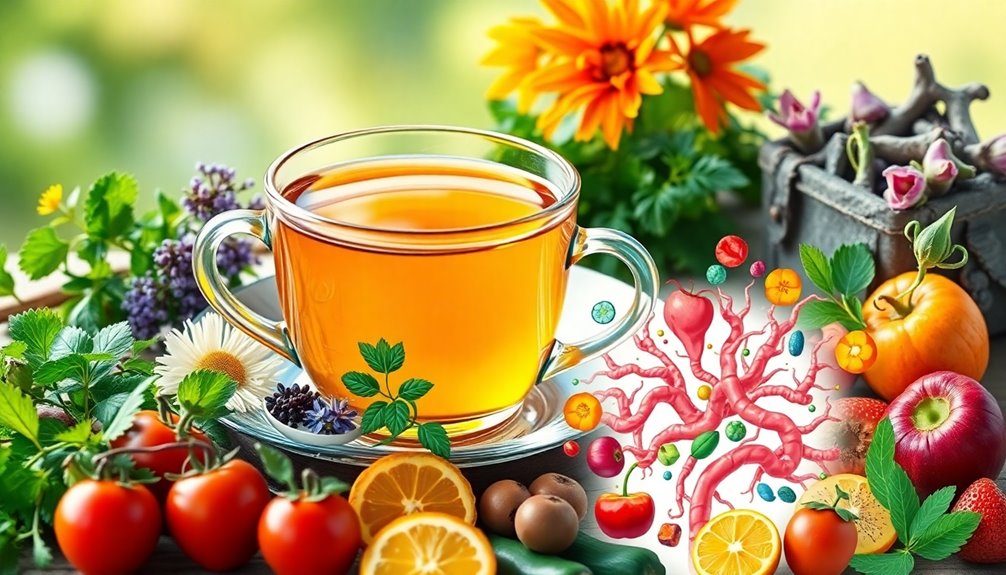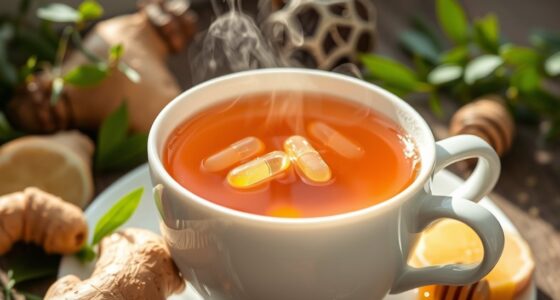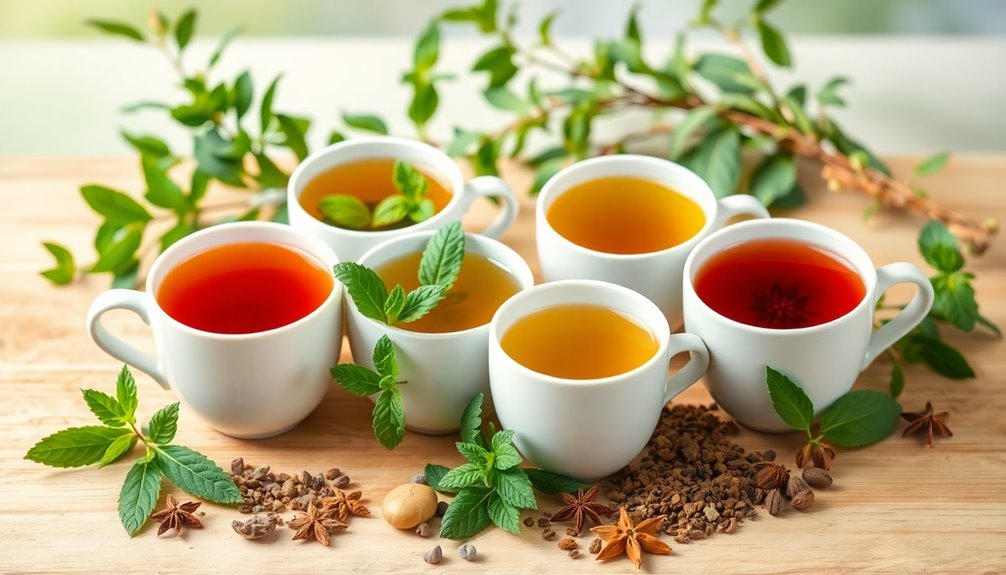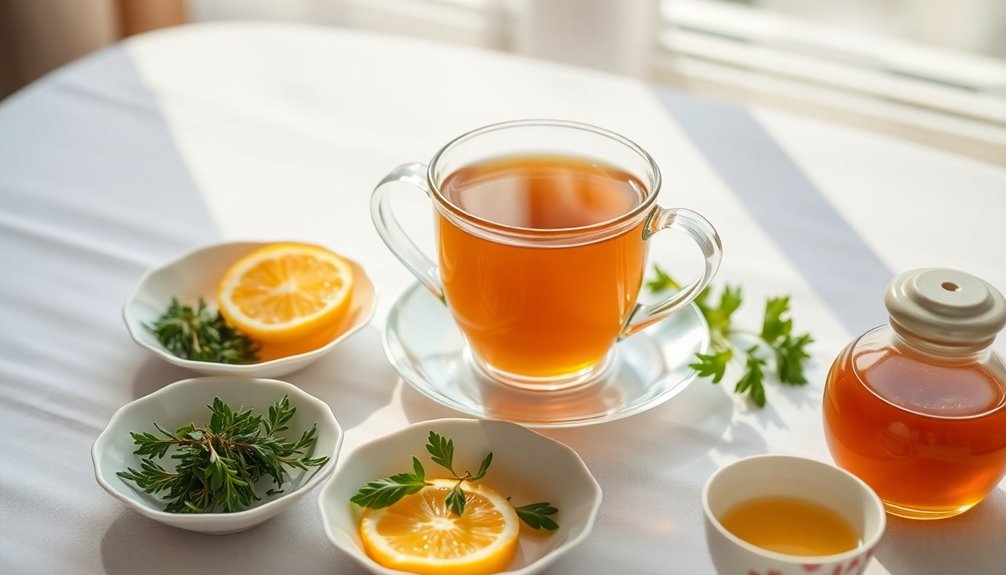Did you know that drinking tea can really help your gut health? It's true! Tea has special things called polyphenols, which are great for your belly. These tiny superheroes help good bacteria grow and make your gut more diverse! Different types of tea, like green and black tea, each offer unique benefits for your tummy. Plus, the more tea you drink, the better you might feel, especially if you have a tummy ache. It's like a tasty, warm hug for your insides! Keep exploring to uncover even more surprises about how tea can help you feel your best!
Key Takeaways
- Regular tea consumption enhances gut microbiome diversity, promoting better digestion and overall gut health.
- Green tea's catechins and polyphenols significantly boost beneficial gut bacteria and reduce inflammation.
- Different tea varieties, like black and pu-erh, offer unique compounds that support gut health in various ways.
- Long-term tea drinkers have a lower risk of gastrointestinal disorders and colorectal cancer due to the health benefits of tea polyphenols.
- Individual responses to tea vary based on genetics and lifestyle, making personalized consumption important for optimizing gut health benefits.
Introduction
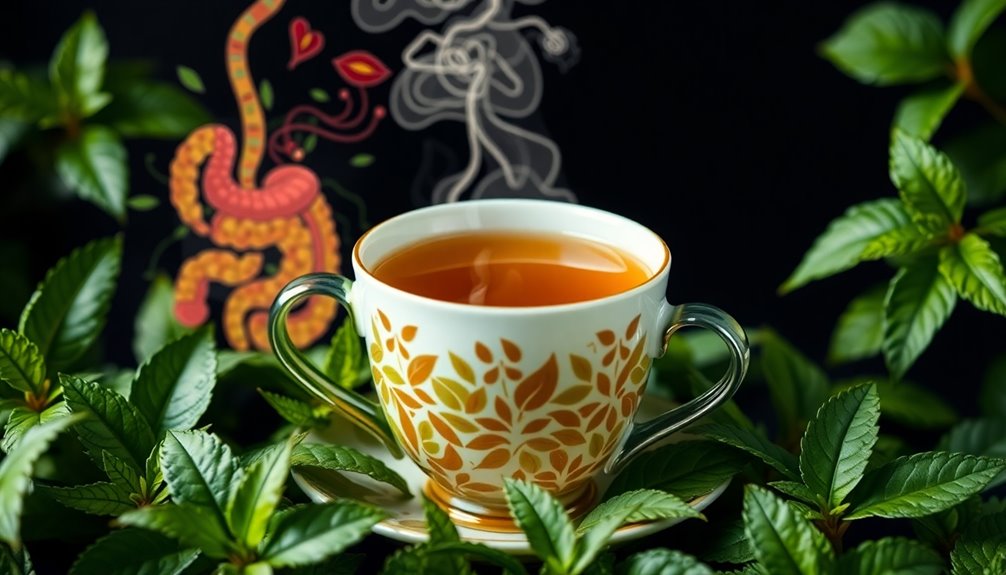
Tea has long been celebrated for its soothing qualities, but its role in gut health is gaining attention. When you sip on a warm cup of tea, you're not just enjoying a tasty drink; you're also helping your gut!
Green tea leaves are packed with bioactive compounds, like polyphenols and catechins, which can boost your gut microbiota. This means it helps the good bacteria in your tummy, improving your digestive health. Studies indicate that different types of tea can have varying effects on gut health, enhancing the benefits of your tea-drinking habits. Furthermore, herbal tea, particularly those with anti-inflammatory properties, can also contribute positively to your gut health.
Drinking tea regularly, especially green and oolong varieties, can reduce gut inflammation, making it easier for your body to stay healthy. Studies show that tea drinkers have more microbial diversity, which is super important for gut health.
One special compound in tea, called EGCG, encourages the growth of beneficial bacteria like Lactobacillus and Bifidobacterium.
With long-term tea enjoyment, you may even lower your risk of gastrointestinal disorders and colorectal cancer! Additionally, antioxidants in tea may further support overall health and wellness.
Tea's Polyphenols Enhance Gut Health
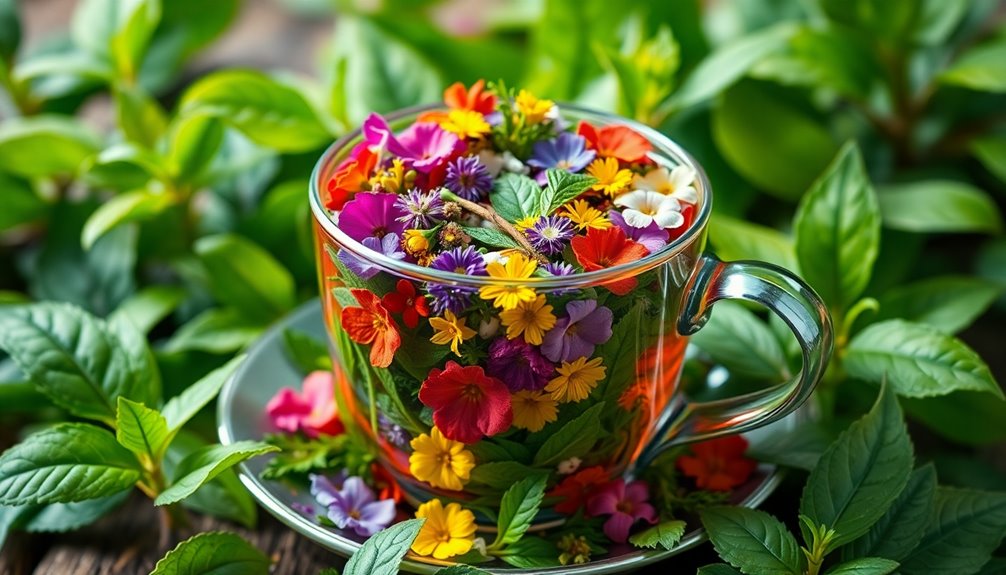
While sipping your favorite cup, you mightn't realize that polyphenols, especially catechins like EGCG, are working wonders for your gut health. These amazing tea polyphenols help boost the growth of beneficial gut bacteria, like Lactobacillus and Bifidobacterium. This means your gut's happy and healthy!
Regular tea consumption can improve gut microbiota diversity. When your gut has a variety of good bacteria, it leads to better health outcomes and can even lower the risk of digestive issues.
Plus, tea polyphenols can help reduce inflammation and improve gut permeability, making your gut an even better place for those friendly bacteria to thrive.
When tea polyphenols ferment in your colon, they produce short-chain fatty acids, which are super helpful for your gut health. Studies show that long-term tea drinkers have a lower risk of colorectal cancer and report fewer digestive troubles.
Tea Polyphenols Boost Beneficial Bacteria
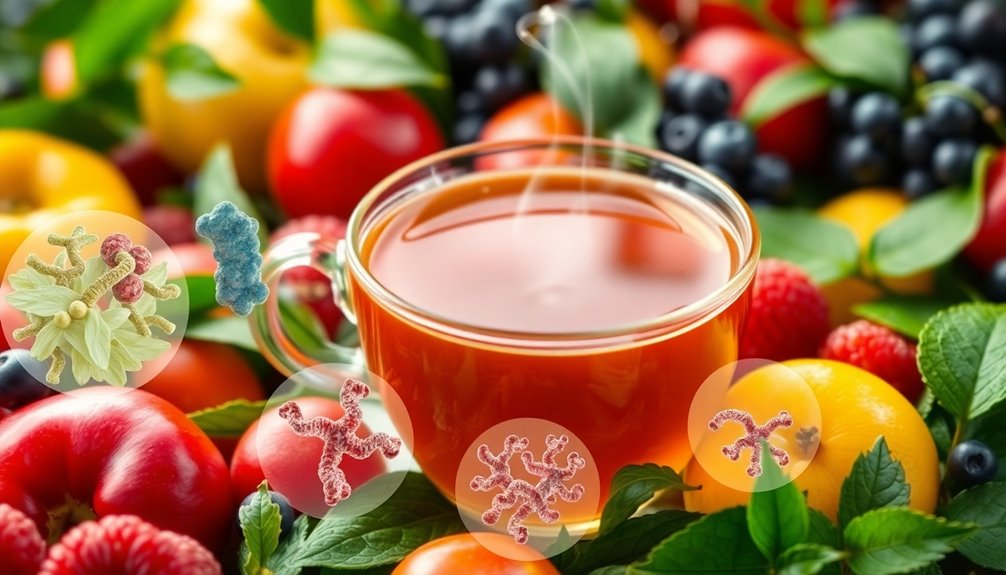
Sip your tea and know that those beneficial bacteria in your gut are getting a boost! Tea polyphenols, especially tea catechins like EGCG, work wonders for your gut health. These special compounds help your gut bacteria, like Lactobacillus and Bifidobacterium, grow and thrive.
When you drink tea regularly, you're not just enjoying a warm cup; you're also improving your gut microbiota diversity. More diverse gut bacteria mean better health benefits for you! Studies show that tea drinkers often have reduced gut inflammation and increased production of short-chain fatty acids (SCFAs), which are great for your digestive tract. Additionally, tea is rich in antioxidants that combat oxidative stress, further supporting gut health. The global tea market, valued at approximately $200 billion in 2022, reflects the growing recognition of tea's health benefits, including its impact on gut health. Herbal teas, such as chamomile, can also contribute to digestive wellness.
These tiny fatty acids help keep your gut healthy and happy. Whether you sip green, oolong, or black tea, you're inviting good bacteria into your system. This means your gut can fight off gastrointestinal disorders more easily, too! Additionally, regular tea consumption has been linked to improved overall health benefits, making it a smart choice for your daily routine.
Tea Variety Impacts Microbiome Diversity
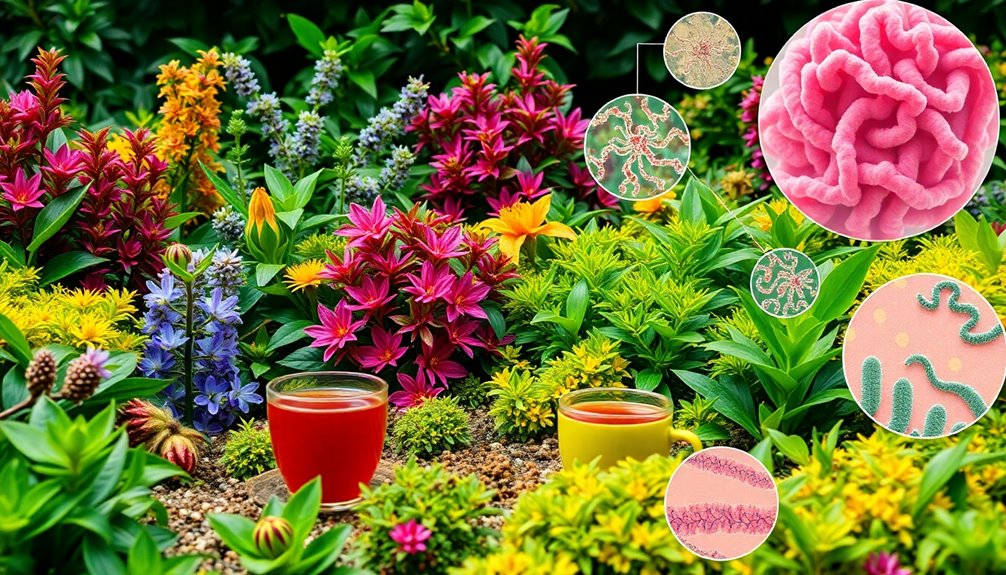
When it comes to enhancing microbiome diversity, the type of tea you choose plays a crucial role. Each tea variety, like green tea, black tea, and Pu-erh tea, brings something special to your gut health.
Green tea, packed with catechins, can help boost beneficial gut bacteria, like Lactobacillus and Bifidobacterium. This means more diversity in your gut microbiome, which is great for your overall health!
Black tea is another fantastic choice. Though it has fewer catechins, its high flavonoid content can also improve gut microbiome diversity. Studies show that people who drink tea regularly enjoy better health outcomes, including less inflammation and improved digestion.
Don't forget about Pu-erh tea! This tea undergoes fermentation, which creates unique compounds that can change the way gut bacteria behave. Each sip can help your gut microbiome thrive in different ways.
Variability in Individual Responses
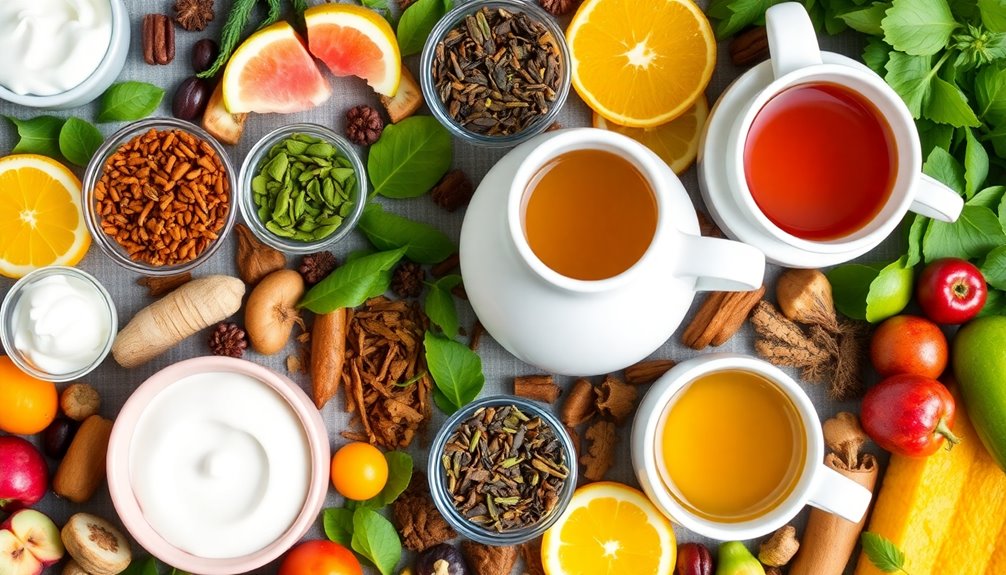
Individual responses to tea consumption can vary widely, largely due to the unique composition of your gut microbiota. Some people may find that the polyphenols in tea work wonders for their friendly gut bacteria, while others mightn't notice much change. This difference often comes down to your gut microbiota composition and how well your body absorbs the beneficial components of tea.
Genetic factors play a role too! Different enzymes in your body can affect how effectively you metabolize tea compounds. Plus, lifestyle factors like what you eat, how much you exercise, and your stress levels can also influence your gut health.
You might be surprised to learn that the baseline diversity of your gut microbiome can predict how much tea benefits you. If your gut is diverse, you could experience greater positive changes after drinking tea regularly.
That's where personalized nutrition comes in! By considering your individual microbiome profile, you can enhance the effects of tea as a dietary intervention for better gut health. So, the next time you sip tea, remember that your unique gut is part of the journey!
Practical Applications
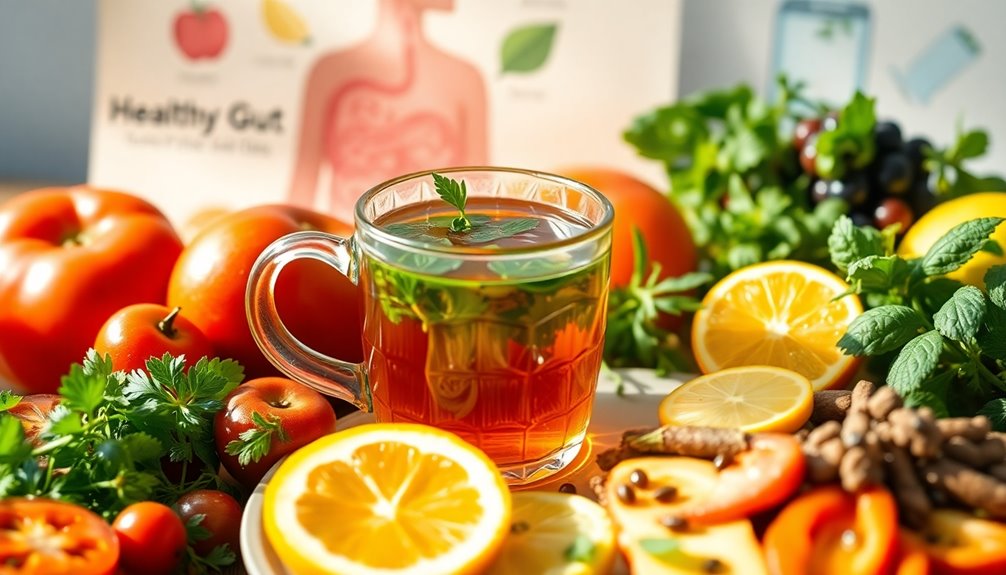
Incorporating tea into your daily routine can be a simple yet effective way to boost your gut health. Drinking tea, especially green or oolong, can help you improve your gut flora and increase microbiota diversity. This means you're encouraging the growth of beneficial gut bacteria like Lactobacillus and Bifidobacterium. These bacteria are like little superheroes for your tummy!
Drinking tea regularly can also help reduce symptoms of gastrointestinal disorders, giving your gut a protective shield. Plus, the polyphenols in tea, like catechins, work hard to support your gut health. Isn't that great?
By sipping tea, you can even boost the production of short-chain fatty acids (SCFAs) in your gut, which are super helpful for your overall health and metabolism. Long-term tea drinkers may even lower their risk of colorectal cancer—talk about a win!
Of course, it's always a good idea to check with your doctor for medical advice before making big changes to your diet.
Frequently Asked Questions
Does Drinking Tea Affect Gut Health?
Drinking tea can positively affect your gut health. It promotes beneficial bacteria growth, enhances microbiota diversity, and may reduce inflammation. Incorporating various types of tea into your routine could lead to better overall digestive wellness.
What Naturally Kills Bad Bacteria in the Gut?
To naturally kill bad bacteria in your gut, focus on consuming foods rich in polyphenols, like fruits, vegetables, and tea. These compounds promote beneficial bacteria, helping to maintain a balanced and healthy gut environment.
What Are the Symptoms of an Unhealthy Gut?
If you've got an unhealthy gut, you might experience bloating, gas, diarrhea, chronic fatigue, skin issues, or even mental health problems like anxiety. These signs often indicate an imbalance in your gut bacteria.
Is Tea Bad for Leaky Gut?
Tea isn't bad for leaky gut; in fact, it can actually help. Its polyphenols and catechins support gut health by promoting beneficial bacteria and reducing inflammation, which aids in maintaining a healthy gut barrier.
Conclusion
So, drinking tea can be a fun and tasty way to help your gut feel great! The special plant compounds in tea boost the good bacteria in your tummy and make your microbiome happier. Plus, trying different types of tea can make this journey even more exciting! Remember, everyone's belly is unique, so you might find your favorite flavor. So, grab a cup of your favorite tea and enjoy the benefits for your gut health! Cheers!

